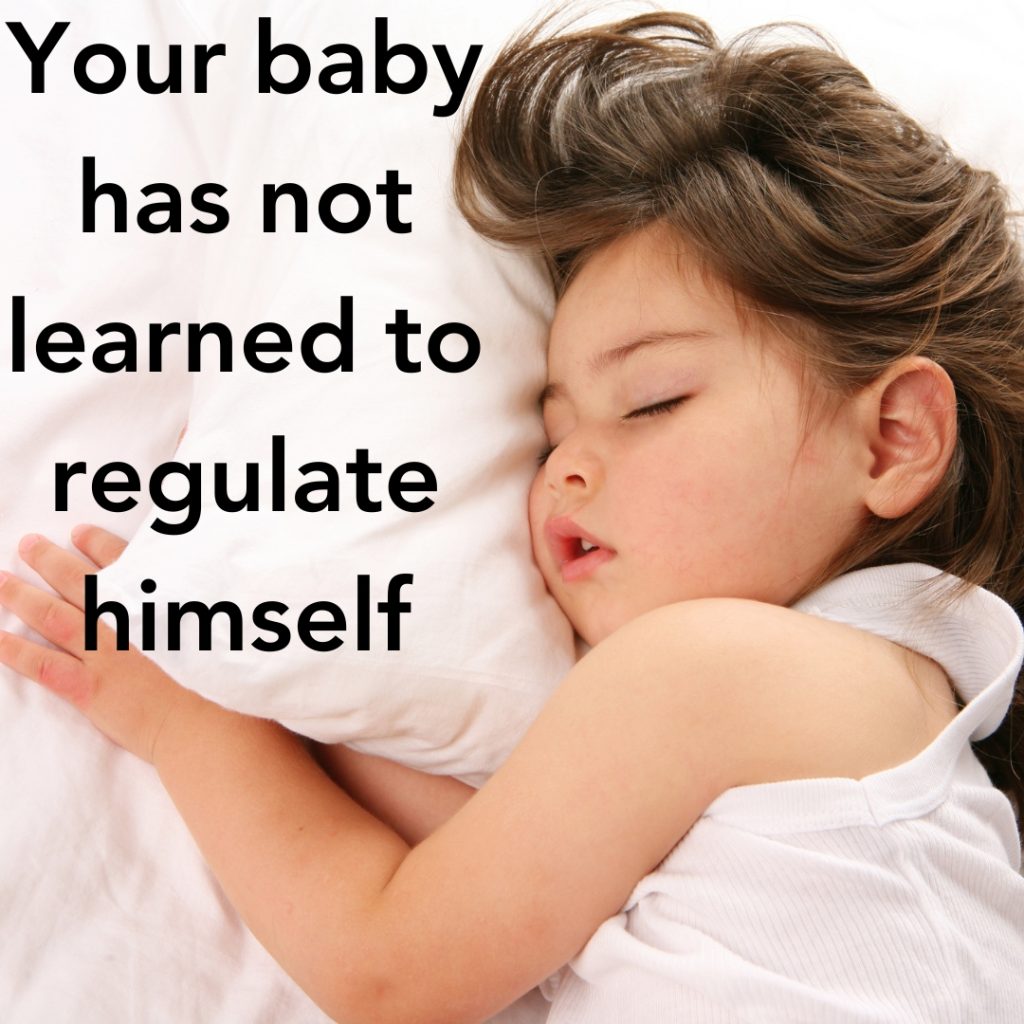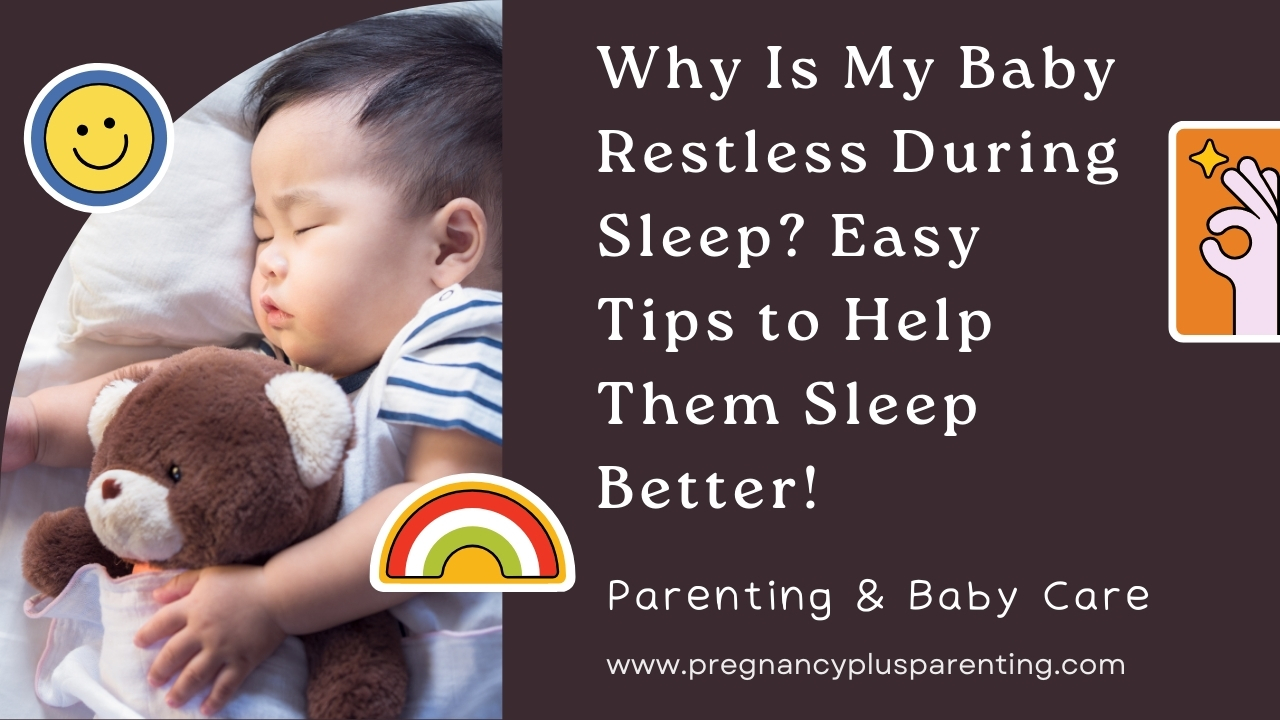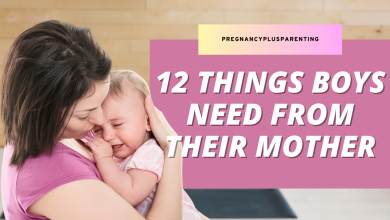Why Is My Baby Restless During Sleep? Easy Tips to Help Them Sleep Better!
When the little sunshine finally arrives, parents have to say goodbye to peaceful nights and proper sleep is a thing of the past.
Once your little bundle of joy has been put to bed after a long, exciting, but also tiring day, you look forward to a bit of relaxation, but the baby sleeps restlessly and this causes problems for the parents.
It is beneficial to learn more about baby sleep and to interpret the baby’s signals so that your little one can soon sleep peacefully (again).
This article is about the reasons why babies sleep restlessly and what can help to change that.
Here you will also learn why newborns have restless sleep and how you can ensure more restful nights.
Why your baby sleeps restlessly despite a sleep routine
If you’ve already established a regular daily routine and bedtime rituals are part of your everyday life, you may be wondering why your baby isn’t sleeping well. Perhaps they were a good sleeper for a while, but are suddenly restless again at night?
Sleep experts know that babies have developed a day-night rhythm by 6 months, but that restless nights are still common. For example, a 2018 study found that 27% to 57% of babies between 6 and 12 months of age don’t sleep through the night.
So you are not alone, dear mom!
The following reasons may be behind your baby sleeping restlessly (again).
1. Teething is bothering your baby
Many babies begin teething at 6 months, according to an article in Healthline . The symptoms, which unfortunately include restless nights, can appear well before the first tooth erupts.
Some babies do not show any of the symptoms, for example, they do not have red and swollen gums or a teething rash, but they sleep very restlessly, as one mother’s experience in the article mentioned shows.
What helps?
If you suspect your baby is teething , cooling the gums with a damp cloth can help. Gently massaging the gums with your finger or a cool, damp cloth can also relieve discomfort. Teething rings can also help if your baby is chewing on objects.
2. Your baby has not learned to regulate himself
If it is common for your baby to only fall asleep in your arms , be carried around to sleep, or even be driven around in the car, this could also be the reason for the restless nights.
According to the Federal Centre for Mental Health (BZgA), children get used to this and don’t learn to regulate themselves. If they wake up briefly between sleep cycles, they can’t go back to sleep peacefully on their own. If the baby doesn’t receive the usual sleep aids, restless sleep is the result, as they haven’t learned to regulate themselves.

Perhaps you’re trying to get your baby used to a crib after sleeping in your parents’ bed. No matter how gently you transfer your little one from your arms to the crib, if they feel like you’re not there at night, they’ll sleep restlessly, as a US article explains.
However, if your baby has been used to their crib for a while but suddenly starts sleeping restlessly, it’s probably a phase and may be related to sleep regression, which is explained in the next section.
What helps?
To eliminate habits that are no longer helpful and help your baby sleep more peacefully, you should be patient and loving, but consistent, as the BZgA explains .
It’s important that your baby has time to adjust, that you guide them gradually into the new sleeping situation, and that you remain consistent. It’s important that you be consistent with your child during the day, too, and not just at bedtime.
3. Your baby is going through a sleep regression
If your baby has been sleeping well up until now, but the nights suddenly become restless again, you may be dealing with sleep regression.
A US-American scientific article explains that such regressions in sleep behavior are normal, occur frequently in babies aged 4, 8 and 12 months and can last between 2 and 6 weeks.
Babies not only sleep restlessly, but also wake up more often, cry more than usual and resist falling asleep.

In 4-month-old infants, sleep regressions are related to the development of baby’s sleep phases. In older babies, they are related to cognitive and motor development, as they learn to crawl, sit, and pull themselves up.
What helps?
It’s good to prepare for these phases of sleep regression. As one sleep consultant recommends , you should make sure your baby’s waking periods during the day are neither too long nor too short.
During the day, help your baby practice their new skills with playful activities that stimulate both mind and body. Additionally, don’t delay bedtime too much at night and make an effort to maintain a healthy sleep routine.
4. You have introduced complementary foods
If you’ve started introducing solid foods and hoped your baby would sleep better, but instead, the nights have become more restless, then you’ve fallen victim to a myth, as this article from a sleep consultant explains.
Your baby may enjoy solid food so much that they overindulge and eat too much. And with a full tummy, they’ll simply sleep more restlessly.
But you should also keep in mind that your child will have to get used to the change and that digestion may be difficult at night.
His little body is producing new intestinal bacteria, his bowel movements are changing and he may be plagued by flatulence.
These are all understandable reasons for restless sleep.
What helps?
Find out which foods are suitable for starting solids and give your baby time to adjust to this exciting transition. Hopefully, restless sleep will soon be a thing of the past.
5. You are about to wean
No matter what your reasons for deciding and taking the initiative to wean your baby, experts know it’s an emotional and difficult experience for them .
Remember that breastfeeding is not just about providing your baby with food, it is also a special way for them to feel close to you, which is soothing and makes them feel safe.
So it’s no wonder that your baby sleeps restlessly when you’re in the process of weaning.
What helps?
If possible, avoid weaning suddenly and proceed slowly.
Experts recommend the “don’t offer, don’t refuse” method, where you stop offering the breast to your baby but don’t refuse it if it wants to breastfeed.
Change certain routines, such as leaving out the nursing pillow or using a different spot in the house for breastfeeding. If dad or another family member introduces new bedtime routines in the evening and you give your baby plenty of attention during the day, this can help ensure more restful sleep.
Babies simply sleep differently than adults
If you’ve recently welcomed your baby, you’re probably surprised and perhaps even concerned that your newborn is having trouble sleeping. All I can say is: Welcome to the club, mom!
There was no day and no night in your womb, so your newborn must first learn that the night is for sleeping.
In addition , according to US pediatricians , parents should understand that babies sleep differently (and more restlessly) than adults.
Babies spend half of their sleep time in what is known as REM sleep, or dream sleep, which is twice as much as adults.
Their sleep cycle lasts only 50-60 minutes, compared to the usual 90 minutes. So it’s no wonder your little one wakes up every hour or sleeps restlessly.
What you can do to help your newborn sleep more peacefully
This special baby sleep, which you can’t change and which takes time to develop, is also one of the reasons why babies cry in their sleep . No need to worry, dear mom!
However, you can still help your baby (and yourself) to make the nights a little more peaceful.
An article from Fo Health gives good advice on how you can teach your baby a day-night rhythm step by step, which also leads to calmer nights:
1. Help your baby distinguish between day and night
Open the blinds or curtains during the day and let plenty of natural light in. Behave quietly as you would during the day—so turn on the radio if you feel like it.
When you dim the lights in the evening and the daytime noises disappear, you make it easier for your baby to tell the difference between day and night.

2. Avoid playing with your baby or exposing him to stimuli in the evening
Newborns, in particular, are sensitive to their surroundings, and it’s easy to become overstimulated. Instead of taking your little one for a long walk, for example, you could sing them a lullaby in the evening.
By the way, that is also part of the next step.
3. Work on a bedtime routine
Consider a bedtime routine that works for you and your baby. Perhaps you bathe your little one before bed, hum a lullaby, and wrap him or her in his or her sleeping bag.
Repeat the ritual every night so your baby associates it with bedtime at night.
4. Put your baby to sleep while he or she is still awake
Pay attention to your baby’s tired cues. If you think they’re sleepy, put them down in their crib. This will prevent them from learning to fall asleep in your arms and demanding this later on (even in the middle of the night).
By the way, you should always lay your baby on their back. There should be no pillows, blankets, stuffed animals, or other objects near their sleeping area, as recommended by the German Society for the Prevention of Infant Death (DGSM) . This reduces the risk of sudden infant death syndrome.
5. Give your baby a sense of security
If your baby is crying and sleeping restlessly at night, you can calm them down and reassure them with physical contact. For example, place your hand on their body or gently stroke them. This will help your little one feel safe.
Final thoughts
Everyday life with a baby demands a lot from parents and it can be very stressful and frustrating if the baby sleeps restlessly and you cannot get any rest at night.
Even if it doesn’t help against overtiredness, it is at least a relief to know that babies simply sleep differently than adults and that restless nights are nothing to worry about.
In this article, you’ve learned what might be causing your baby to suddenly sleep restlessly. You’ve also received tips on how to deal with these issues so that you can soon experience more peaceful nights.
New parents have also read about why babies’ sleep is so restless and received suggestions on how they can help their little darling develop a day-night rhythm and sleep more peacefully.
I wish you a lot of patience and strength and hope that this information is helpful!







